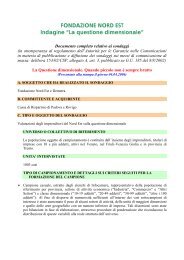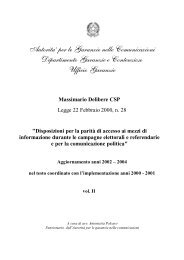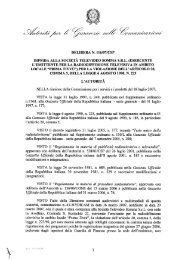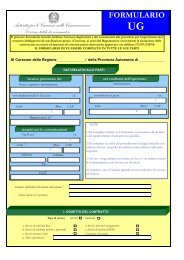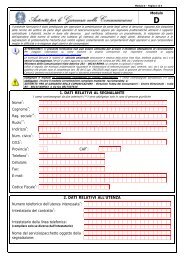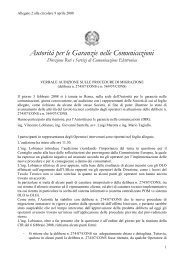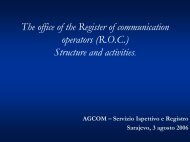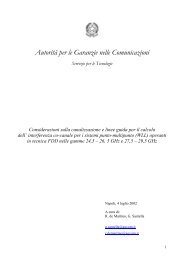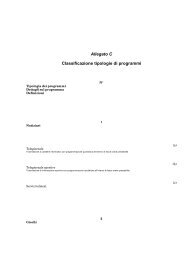Communications Regulatory Authority
Communications Regulatory Authority
Communications Regulatory Authority
You also want an ePaper? Increase the reach of your titles
YUMPU automatically turns print PDFs into web optimized ePapers that Google loves.
With Resolution no. 417/04/CONS setting forth “regulations settling conflicts of<br />
interest” AGCOM set out and worked out organisational changes and regulatory actions<br />
relating to procedures and ascertainment criteria provided for within the scope of the<br />
conflict of interest. This resolution was amended to a significant extent by AGCOM<br />
Resolution no. 392/05/CONS setting forth “amendments and supplements to regulations<br />
settling conflicts of interest”, pursuant to which the “privileged support” ascertainment<br />
phase shall be carried out by AGCOM’s Council, while the Commission for Services<br />
and Products shall carry out preliminary investigations and ascertain any lawbreaking<br />
which was a precondition to such support, in all cases where the ascertainment of any<br />
lawbreaking has already been entrusted by law to the Commission.<br />
Regulations approved in 2004 laid the responsibility of the totality of<br />
proceedings involving a conflict of interests (in their two phases which involve<br />
verifying a breach of the benchmark law and subsequently ascertaining any privileged<br />
support) within AGCOM’s Council’s remit. The reason was to be found in article 1,<br />
paragraph 6, letter c, no. 14 of law no. 249 of 31 July 1997, under which AGCOM’s<br />
Council shall exercise all functions and powers not explicitly granted either to the<br />
Commission for Services and Products or to the Commission for Infrastructures and<br />
Networks.<br />
The complex case of the conflict of interests was conceived as a unique<br />
example, whose relevant functions and scope were entrusted to AGCOM’s Council.<br />
In time, the implementation practice showed that the breach of some provisions relating<br />
to “benchmark” laws – law no. 223 of 6 August 1990, law no. 249 of 31 July 1997, law<br />
no. 28 of 22 February 2000, and law no. 112 of 3 May 2004 – was relevant with respect<br />
to responsibilities law-makers had already entrusted AGCOM with, and whose<br />
procedure had already been set out by explicitly laying them on a collegiate body<br />
different from the Council. Reference is made in particular to the breach of provisions<br />
pursuant to laws no. 112/04 and no. 28/00 and relating to the compliance with principles<br />
of pluralism, objectivity, completeness, fairness and impartiality of information, and<br />
provisions on “par condicio” (equal access to the media) in whose respect AGCOM’s<br />
Commission for Services and Products is granted supervisory, ascertaining and<br />
sanctioning powers pursuant to law no. 249/97.<br />
From the impossibility to bring the whole procedure involving conflicts of<br />
interests unequivocally within the Council’s scope the need arose, with respect to cases<br />
in point, to bring the ascertainment function within the Commission for Services and<br />
Products’ scope. Moreover, by following this approach a homogenous treatment can be<br />
guaranteed, from a procedural viewpoint, to all radio and television undertakings as to<br />
rules and regulations governing par condicio and the compliance with information<br />
pluralism principles.<br />
On the contrary, under the previous regulatory system, a breach among those<br />
mentioned above would have fallen either within the Council’s scope or within the<br />
209



